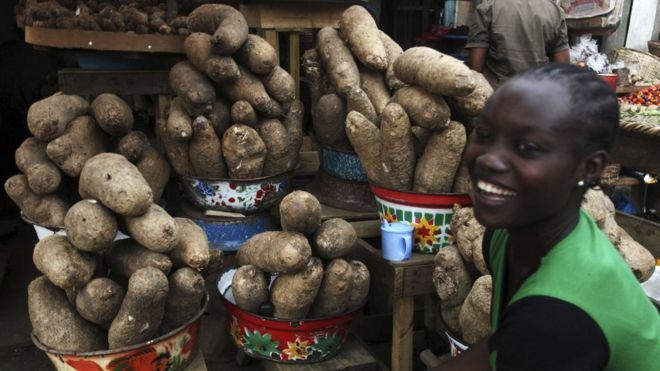Can Nigeria’s yams power a nation?

Can Africa’s biggest economy swap its addiction to oil for the starchy tubers that millions line their bellies with each day?
“It’s our biggest hope,” says Nigeria’s Minister of Agriculture and Rural Development Audu Ogbeh.
The global slump in oil prices has hit the West African nation hard, where oil exports make up more than 70% of government revenues.
Yam production meanwhile is thriving – in fact the UN’s food agency says Nigeria produces more than 60% of the entire world’s yams.
Despite this, Nigeria is not one of the world top exporters.
Its neighbour, Ghana, produces far less but exports more yams to European countries such as the UK than Nigeria does.
Spotting this discrepancy, Nigeria launched an ambitious yam export scheme earlier this year.
What are yams?

- Yams are a staple food in temperate and sub-tropical regions – including Africa, the Caribbean and the South Pacific
- They are starchy, fibrous tubers which are grown in the ground
- Yams have brown tough skins and the flesh can vary in colour – anything from white to yellow to purple – depending on the variety
- It can be cooked numerous ways – boiled, fried or roasted
- Pounded yam or fufu – made by boiling, mashing and shaping yam flesh into balls – is a popular accompaniment to soups and stews in Nigeria and Ghana
It is hoped that exporting more yam will diversify Nigeria’s oil-dependent economy, which has plunged into its worst recession in a quarter of a century because of falling global oil prices over the past couple of years.
The government also wants to provide young people in particular with jobs in agriculture.
‘We need more help’
But Nigeria lacks good storage facilities, the transportation system is very poor, and local traders and exporters are struggling.
There are also concerns that greater demand abroad could inflate prices for customers at home, potentially hitting the poorest who rely most on the staple food.
”We need help from the government,” says Cecilia John, a farmer, who nevertheless backs the push for exports.










0 Comments